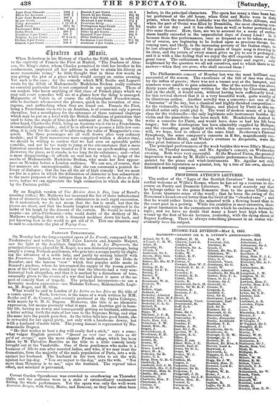PARISIAN TREArescArs.
On Monday last the long-expected opera of La .Fronde, composed by M. Niedermeyer and written by MM. Jules Lacroix and Auguste Magnet, saw the light at the Academie Imperiale. As in Lea Huguenots, the principal character, played by M. Roger, is a non-historical personage, being simply a young Norman gentleman, who gets into a scrape partly by slight- ing the advances of a noble lady, and partly by mixing himself with the Frondeurs. Indeed, were it not for the introduction of the Duke de Beaufort, and the famous "row " which that popular noble made in Renard's gardens, where he interrupted the supper of the young gentle- men of the Court party, we should say that the libretto had a very non- historical look altogether, and that it is marked by a dismalness of tone, unusually given to the events of a war that had about it more of the as- pect of comedy than of tragedy. The principal interpreters—to use a favourite modern expression—are Madame Tedesco, Mademoiselle Lege- na, M. Roger, and M. Obin.
What would be said in London of La 'dire an bon Dieu as the title of a comic opera? Such, however, is the name of a work written by MM. Scribe and F. de Courcy, and recently produced at the Opera Comique, with music by G. M. G. Duprez. Moreover, this title is no idiomatic expression, but means precisely what it says. An Austrian girl in hum- ble life, having no dowry and consequently getting no husband, addresses a letter setting forth the state of her case to the Supreme Being, and slips the same into the parish poor-box. As the letter falls into good hands, she is rewarded for her signal piety, not only with a handsome dowry, but with a husband of noble birth. The young damsel is represented by Ma- demoiselle Duprez.
"He that wishes to beat a dog will easily find a stick," says a some-
what vulgar English proverb. " Quand on vent tuer un Mien on dit gu'il est enrage'," says the more elegant French adage, which has been taken by M. Theodore Barriere as the title to a little comedy lately brought out at the Vaudeville. One of those gentlemen who make it a business of life-to run after married ladies, and who, if we may trust the dramatists, form the majority of the male population of Paris, sets a wife against her husband. The husband in his turn tries to set the wife against her lap-dog. "You are unjust to the dog," says the wife. "Not more than Monsieur is to me," says the husband. The reproof takes effect, and misrhief is prevented.


























 Previous page
Previous page